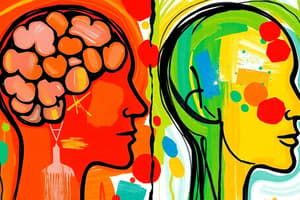Podcast
Questions and Answers
What is a characteristic of a fixed mindset?
What is a characteristic of a fixed mindset?
- Persists through difficulties
- Learns from criticism
- Embraces challenges
- Feels threatened by others' success (correct)
Which concept supports the idea that intelligence can be developed?
Which concept supports the idea that intelligence can be developed?
- Neuroplasticity (correct)
- Resilience
- Self-efficacy
- Fixed mindset
How does a growth mindset influence academic performance?
How does a growth mindset influence academic performance?
- Decreases problem-solving skills
- Causes students to give up easily
- Promotes avoidance of challenges
- Is linked to higher achievement (correct)
What strategy involves seeing obstacles as opportunities?
What strategy involves seeing obstacles as opportunities?
Which trait is enhanced by a growth mindset?
Which trait is enhanced by a growth mindset?
What does self-efficacy refer to?
What does self-efficacy refer to?
What is a common effect of having a growth mindset on professional success?
What is a common effect of having a growth mindset on professional success?
What is emphasized in the strategy of celebrating effort?
What is emphasized in the strategy of celebrating effort?
In what area can mindset principles be applied to improve performance?
In what area can mindset principles be applied to improve performance?
What is a common misconception about a fixed mindset?
What is a common misconception about a fixed mindset?
Flashcards are hidden until you start studying
Study Notes
Mindset Overview
- Definition: Mindset refers to the established set of attitudes held by an individual.
- Importance: Influences behavior, decision-making, and overall success in life.
Types of Mindsets
-
Fixed Mindset
- Belief that abilities and intelligence are static.
- Avoids challenges, gives up easily, and feels threatened by others' success.
- Leads to a desire to appear smart, often resulting in failure to reach potential.
-
Growth Mindset
- Belief that abilities and intelligence can be developed.
- Embraces challenges, persists through difficulties, and learns from criticism.
- Motivated by learning and improvement rather than proving oneself.
Key Concepts
- Neuroplasticity: The brain's ability to reorganize itself by forming new neural connections; supports the growth mindset.
- Self-Efficacy: Belief in one's ability to succeed in specific situations; closely related to mindset.
- Resilience: The capacity to recover quickly from difficulties; a trait enhanced by a growth mindset.
Effects of Mindset
- Academic Performance: A growth mindset is linked to higher achievement and better problem-solving skills.
- Professional Success: Individuals with a growth mindset tend to be more adaptable and innovative.
- Personal Relationships: Mindsets affect communication and conflict resolution; a growth mindset fosters understanding.
Strategies to Cultivate a Growth Mindset
- Embrace Challenges: View obstacles as opportunities to learn.
- Learn from Feedback: Welcome constructive criticism as a tool for growth.
- Celebrate Effort: Recognize and reward effort rather than just results.
- Reflect on Learning: Regularly analyze experiences to extract lessons.
Applications
- Education: Teaching students about mindsets can enhance learning and motivation.
- Coaching: Coaches can use mindset principles to improve athletes' performance and resilience.
- Personal Development: Mindset shifts can aid in achieving personal goals and improving mental health.
Conclusion
- Mindset plays a crucial role in shaping behaviors, responses to challenges, and overall life outcomes.
- Adopting a growth mindset can lead to greater success and fulfillment in various aspects of life.
Mindset Overview
- Defined as an established set of attitudes held by an individual.
- Influences behavior, decision-making, and overall success.
Types of Mindsets
-
Fixed Mindset
- Perceives abilities and intelligence as unchangeable.
- Avoids challenges, easily gives up, and feels threatened by others' success.
- Desire to appear smart often leads to underachieving.
-
Growth Mindset
- Views abilities and intelligence as qualities that can be developed.
- Embraces challenges, persists through difficulties, and learns from feedback.
- Driven by a desire for learning and improvement rather than proving oneself.
Key Concepts
- Neuroplasticity: The brain's capacity to form new neural connections, reinforcing the growth mindset.
- Self-Efficacy: Confidence in one's ability to succeed in specific tasks, tied closely to one's mindset.
- Resilience: The ability to bounce back from challenges; a trait strengthened by a growth mindset.
Effects of Mindset
- Academic Performance: Growth mindset correlates with higher academic achievement and enhanced problem-solving abilities.
- Professional Success: People with a growth mindset are usually more adaptable, innovative, and open to new ideas.
- Personal Relationships: Impacts communication styles and conflict resolution; a growth mindset promotes deeper understanding between individuals.
Strategies to Cultivate a Growth Mindset
- Embrace Challenges: Approach obstacles as opportunities for personal growth.
- Learn from Feedback: Accept constructive criticism as beneficial for improvement.
- Celebrate Effort: Focus on recognizing effort and process rather than only final results.
- Reflect on Learning: Regularly evaluate experiences to identify key lessons and growth points.
Applications
- Education: Incorporating mindset education can enhance student motivation and learning outcomes.
- Coaching: Coaches can apply mindset principles to foster resilience and performance in athletes.
- Personal Development: Shifts in mindset can assist in realizing personal goals and enhancing mental wellbeing.
Conclusion
- Mindset significantly influences behavior and responses to challenges, impacting life success.
- Adopting a growth mindset can maximize personal fulfillment and achievement across various life domains.
Studying That Suits You
Use AI to generate personalized quizzes and flashcards to suit your learning preferences.




